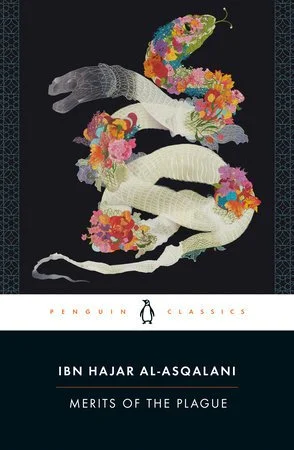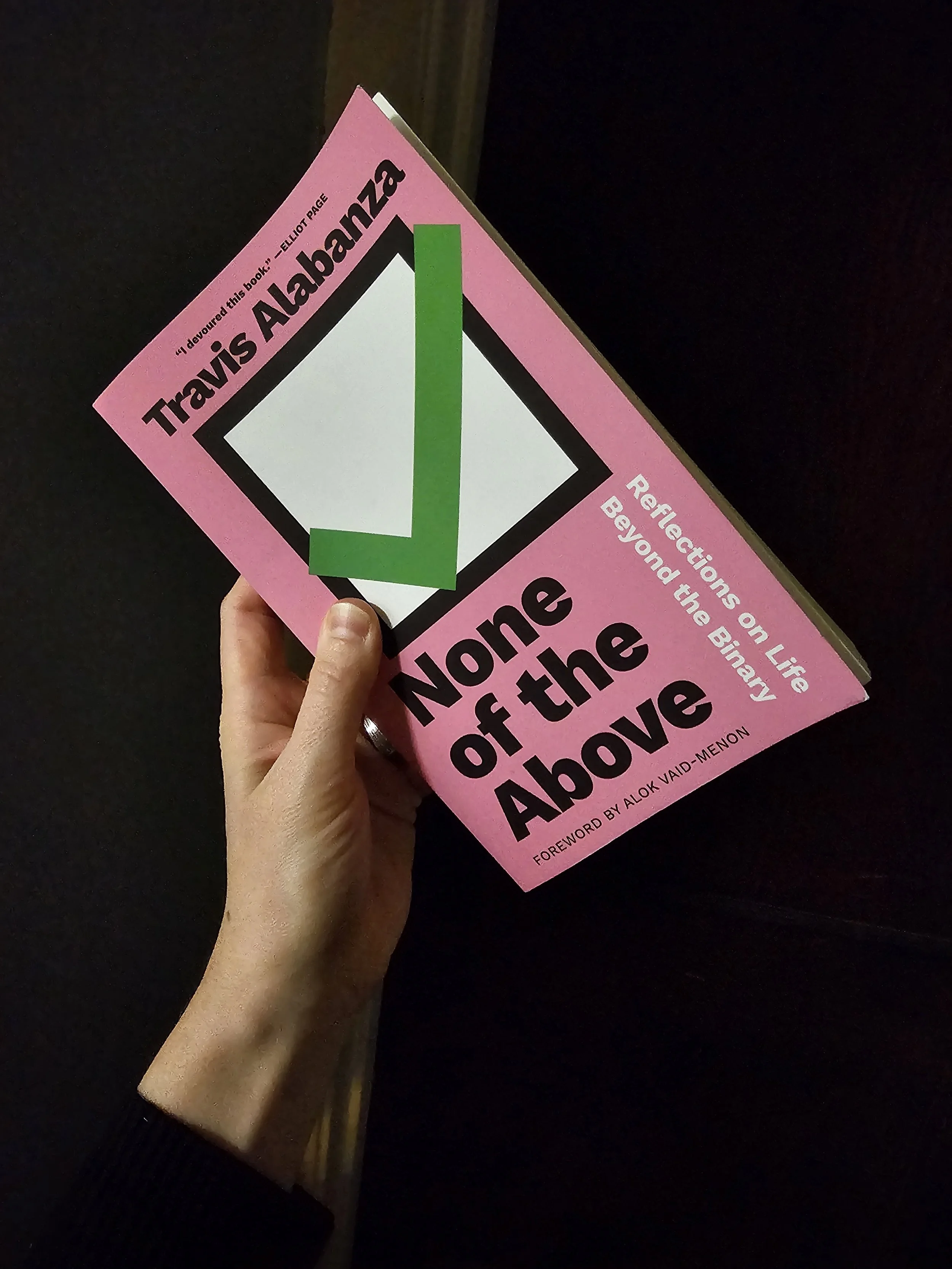Edgar's Book Round-Up, November 2023
What can I even say? I mean, okay, there’s some things one might say, but probably better to keep it off of Al Gore’s internet. Call your reps and give to appropriate organizations. This one’s also shorter than usual because I have been undergoing personal problems that are beyond the scope of this book round-up and made it tough to get much reading done. Links here, as always, go to Bookshop.
※
The cover; I got my copy, which I promptly loaned to someone, at Turnsol Books!
I led off the month by wrapping up Merits of the Plague by Ibn Hajar al-Asqalani, translated into English for the first time for Penguin Classics by Mairaj Syed and Joel Blecher. Written six hundred years ago, Ibn Hajar offers reflections from a learned, Islamic standpoint on the Black Death, exploring its nature and its meaning, as well as appropriate responses to it for faithful Muslims. I am broadly familiar with European, Christian responses to the plague, so it was fascinating to see how the more advanced Islamic world conceptualized the plague and how to think about it. Ibn Hajar lost multiple family members, including two daughters and their children, to the plague, in addition to seeing how the terror of this sweeping pandemic drove rifts into his communities, both local and spiritual. Syed and Blecher also offer robust introductory and explanatory material, in addition to rendering Ibn Hajar’s scholarly Arabic into energetic English prose that maintains its source’s gravitas without sacrificing its wit. I also appreciated their decision to place some of the more involved isnads to endnotes, which they charmingly maintain that Ibn Hajar would have loved. A rich and illuminating text, I highly recommend it to anyone interested in the plague of the late fourteenth century.
Right around here is where I started in on Boccaccio’s Decameron, for some reason; I’m still working away at that one, but it is due to that much longer (and bawdier) plague-inspired piece that there are not many print books on this round-up.
In any case, I next finished Stephen King’s Fairy Tale in audiobook form. I am, at best, a scattershot King reader: I’ve read Shining, and Misery, and Carrie, and a handful of also-rans and a Dark Tower or two, but that’s about it, though Cameron has read some of his stuff more recently. I mention this mostly to show that I don’t have much to go on with King, but I also am by no means a stan — which is a bit of a long walk to say that this was delightful. Young Charlie Reade takes a while to explain how he ended up taking care of the dying dog of an aging man, and how he ends up descending a mysterious well in the old man’s back yard that leads to a fantastical realm beset by a plague of gray deliquescence, but frankly, even if it took a while to get going, I was very much along for the ride. The story takes a few obvious turns, but King’s inventiveness keeps the story from being too predictable. A couple of Goodreads reviews thought it was weird that Charlie, ostensibly an 18-year-old in the 2010s, refers solely to classic rock and metal, and seems to only watch TCM; I personally felt like King earned it, and instead of making Charlie a kid with unconvincingly outdated referents managed to make him into a very particular kind of guy. Some genuinely creepy moments, but King has said that this novel was borne from reflecting on what would make him happy to write in the midst of 2020. That comes through: despite the horrors, mundane and magical, to which Charlie bears witness, there’s a hard-won comfort in the novel, which I certainly needed as I was reading it. (Also my name in real life is Charlie and every time someone said something nice to the main character, it sort of felt like they were saying it to me.)
The cover, which is fine.
Next up was Caitlin Starling’s Last to Leave the Room. I’ve enjoyed the other works by Starling that I’ve read; I find myself frequently in a position to recommend Luminous Dead and Death of Miss Jane Lawrence (and here’s where Cameron and I have both talked about her books before). I suspect Last to Leave the Room will not be too much of an exception. In it, we follow Dr. Tamsin Rivers as she seeks both to find out why the city of San Siroco is sinking but, more pressingly, why her basement is sinking faster than the rest of the city and then, more urgently still, what she must do with her doppelganger who appears in the basement and starts trying to help her. The obvious comp here is Sarah Gailey’s The Echo Wife, which I reviewed here, but while Gailey has a sort of irrepressible sense of humor — which doesn’t always work to their benefit but does provide piquant contrast to heavier subject matter — Starling has no such qualms. Dr. Rivers sucks, and not only does the character know it, but the reader knows it, too, which is a lot of fun; while the novel begins as a sly psychological thriller, it takes some hard turns into fucked-up territory at the end, which I also enjoyed. I will note, though, that while I love an unstable mad scientist, Dr. Rivers’ handler, Mx. Woodfield, a suit-and-gloves-wearing butch with a simmering affinity for violence, is right there, a fact that did make me wonder if the novel wasn’t focusing on the less interesting person. Nonetheless, it was an enjoyable read that balanced its various concerns, from the existential terror of the doppelganger to the much more mundane horror of privatizing public services, extremely well.
I got my copy of None of the Above from my friends at Wise Blood!
Next up we have the one print book in this round-up, Travis Alabanza’s None of the Above: Reflections on Life Beyond the Binary, which came out in Britain last year but only made it stateside in this one. In it, Alabanza considers their life as a gender rebel, but also crystallizes a moment in their transition: their decision to begin taking estrogen. While I am fundamentally susceptible to the charms of a nonbinary person’s memoir of their nonbinarity, these works are often frustrating for one reason or another, not least of which is the pressure placed on all trans people to have arrived in their gender in some way — a bonkers ask of any gendered experience, cis or trans, but one that exerts a special force on nonbinary people, whose genders are already viewed as somehow suspect, somehow less stable, than anyone else’s. And Alabanza’s decision to, instead of allowing that arrival, insist on writing from one moment in an ongoing project of selfhood, especially given Alabanza’s relatively high public profile and their identity as a mixed-race Black person in England, was both insightful and powerful. Their insistence on equally weighting the joys and terrors of transness, looking both sides of the scale in the eye without also insisting that one must outweigh the other, was also very effective. This is definitely one of my favorites in the genre, and I look forward to exploring more of Alabanza’s written works.
I followed that with three more audiobooks, the first of which was Two Serpents Rise by Max Gladstone, the second installment in his Craft Sequence. Cameron turned me on to the first one, and since this was available when I needed it, I snapped it up. Gladstone offers a world where, basically, the gods are dead, consumed and controlled by powerful craft-users, who are basically corporate lawyers with cool magical powers, which allows him to use the plot beats of a legal drama in a weird, lush fantasy setting. This novel follows Caleb, the son of a rebel deist, who now works for one of the magical conglomerates that controls most things. But when a series of violent attacks rock the city and threaten its water supply, Caleb will have to reconnect with the past he has tried to escape if he wants to save the city he loves. While it took a hair longer to grab me than Three Parts Dead, I nonetheless really enjoyed this one. Caleb was a fun narrator, and a series of well-earned twists at the end really sealed the deal. I’ll definitely be reading more of these.
I genuinely like this mass-market paperback cover, which features an illustration by the great John Jude Palencar.
Next up was Octavia E. Butler’s classic Parable of the Sower, a book I’ve known that I need to read for a very long time, but only just got around to; Cameron talked about it here. Still, better late than never: Butler’s tale of a young woman driven from her home by societal collapse and her own vision of a better world feels as fresh today as it must have when it first appeared thirty years ago, and its qualities are myriad. Lauren Olamina is a beautifully-drawn character, a perfectly observed portrait of a frighteningly intelligent young woman confined by her circumstances until she fully accepts the divine inspiration that guides and draws her. The satire, especially in the early chapters — every apocalypse is a satire at heart — is sharp and often funny: I literally laughed out loud when Lauren’s mother says something like, “Violence? But the company would never allow that!” and there were several other such moments. It also struck me how much in conversation it seemed to be with the then-burgeoning YA genre, often striking similar chords to other works in that genre from about that time. Basically, it is actually all that and a bag of chips, and if you’ve been told you should read it, you definitely should, and if no one has told you that, consider this me telling you that.
I closed out the month with The Affair of the Mysterious Letter by Alexis Hall, which I learned about through this Tumblr blog and which was not only a delightful romp but also an excellent, sustained riff on the Sherlock-Holmes-meets-eldritch-horrors concept. Part of what makes it work so well is that, instead of overlaying Weird Shit(TM) over top of the historical nineteenth century, it relocates the beats of a Holmes story to a world where Where Shit(TM) is the norm, allowing Shaharazad Haas’s powers of deduction and John Wyndham’s attempts to keep up with and chronicle her feats to really shine. Hall, the rest of whose bibliography seems to be mostly romances, here operates in a mode more similar, say, The Vesuvius Club (which I’m sure someone else has read — haven’t met them, but surely someone other than me remembers that), and in part because of that, the novel feels more in keeping with New Weird writing than anything else I can think of from 2019. I am absolutely not complaining, and I will definitely be reading more of Hall’s work.
※
That’s it. Follow me and Cameron on Bluesky, or on our Tumblr or FB pages.




